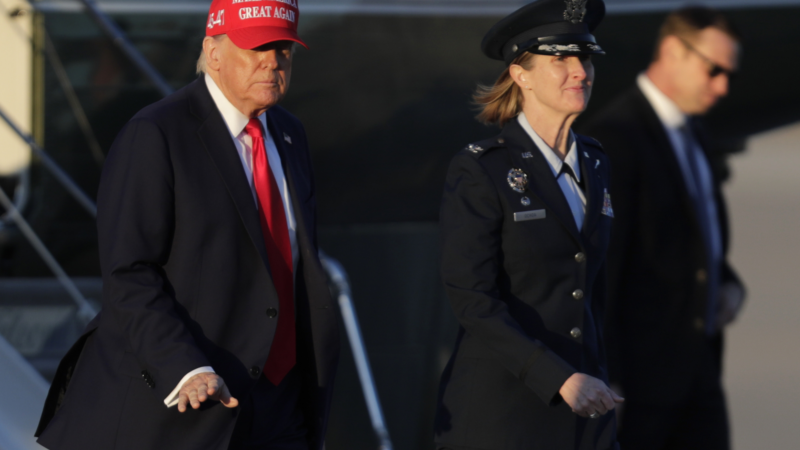Judge rules head of watchdog agency must keep his job, says his firing was unlawful
WASHINGTON — The head of a federal watchdog agency must remain in his job, a judge in Washington ruled on Saturday, saying President Donald Trump’s bid to remove the special counsel was unlawful.
U.S. District Judge Amy Berman Jackson sided with Hampton Dellinger, who leads the Office of Special Counsel, in a legal battle over the president’s authority to oust the head of the independent agency that’s likely headed back to the U.S. Supreme Court.
Dellinger sued Trump last month after he was fired, even though the law says special counsels can be removed by the president “only for inefficiency, neglect of duty, or malfeasance in office.” Jackson, who was nominated to the bench by Democratic president Barack Obama, quickly reinstated Dellinger in the job while he pursued his case.
Jackson rejected the Trump administration’s claims that the special counsel’s removal protections are unconstitutional because they prevent the president from rightfully installing his preferred agency head.
The judge said allowing the president to remove the special counsel at will would have a chilling effect on his crucial duties, which include guarding the federal workforce from illegal personnel actions, such as retaliation for whistleblowing.
“The Special Counsel is supposed to withstand the winds of political change and help ensure that no government servant of either party becomes the subject of prohibited employment practices or faces reprisals for calling out wrongdoing — by holdovers from a previous administration or by officials of the new one,” Jackson wrote in her decision.
The Justice Department quickly filed court papers indicating it will challenge the ruling to Washington’s federal appeals court. The case has already gone up once to the Supreme Court, which previously temporarily allowed Dellinger to remain in his job.
The ruling comes as Dellinger is challenging the removal of probationary workers who were fired as part of the Trump administration’s massive overhaul of the government. A federal board on Tuesday halted the terminations of several probationary workers after Dellinger said their firings may have been unlawful.
“I’m glad and grateful to see the court confirm the importance and legality of the job protections Congress afforded my position,” Dellinger said in a statement on Saturday. “My efforts to protect federal employees generally, and whistleblowers in particular, from unlawful treatment will continue.”
The judge said the special counsel has a “unique status and mission,” which requires independence from the president to ensure he can carry out his responsibilities. The office investigates whistleblower claims of reprisal, can pursue disciplinary action against employees who punish whistleblowers and provides a channel for employees to disclose government wrongdoing.
“If I don’t have independence, if I can be removed for no good reason, federal employees are going to have no good reason to come to me,” Dellinger told reporters outside Washington’s federal courthouse after a recent hearing.
The Office of Special Counsel is also responsible for enforcing the Hatch Act, which restricts the partisan political activities of government workers. Dellinger’s firing came as Trump administration employees have touted their support on social media for his policies even though the Hatch Act is meant to restrict political advocacy while on duty.
The Justice Department employed sweeping language in urging the Supreme Court last month to allow the termination of the head of an obscure federal agency with limited power. Acting Solicitor General Sarah Harris wrote in court papers that the lower court had crossed “a constitutional red line” by blocking Dellinger’s firing and stopping Trump “from shaping the agenda of an executive-branch agency in the new administration’s critical first days.”
Dellinger was appointed by Democratic President Joe Biden and confirmed by the Senate to a five-year term in 2024.
Taiwan’s president pledges to defend island’s sovereignty after Chinese military drills
Taiwanese President Lai Ching-te vowed to defend the self-ruled island's sovereignty in the face of what he termed China's "expansionist ambitions," days after Beijing wrapped up live-fire military drills near its shores.
Deaths reported during widening protests in Iran sparked by ailing economy
The protests began due to economic pressures, with Iran's currency rapidly depreciating. Demonstrators have also chanted against the country's theocracy.
Congress failed to extend Obamacare subsidies. This Democrat says Trump can save them
Sen. Peter Welch, D-Vt., says he thinks the Senate can pass a "retroactive" Affordable Care Act subsidy extension, but "we need President Trump."
Rideshare union rights, social media limits and other state laws taking effect Jan. 1
Every new year, public media reporters across the country bring us some of the new state laws taking effect where they are. Here are six in 2026.
Guides to help you tackle your New Year’s resolutions
From building your strength to tackling credit card debt, NPR's Life Kit has a newsletter journey to help you tackle your New Year's resolution.
Guides to help you tackle your New Year’s resolutions
From building your strength to tackling credit card debt, NPR's Life Kit has a newsletter journey to help you tackle your New Year's resolution.






